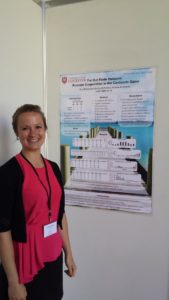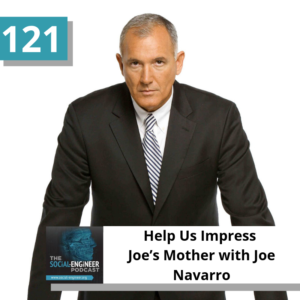Mon, 11 May 2020
Key Points:
Resources Mentioned:
Direct download: Social-EngineerPodcastEp129.mp3
Category:Human Element Series -- posted at: 4:00am EDT |
Mon, 13 April 2020
Episode Highlights:
3 Key Points:
Resources Mentioned:
Direct download: Social-EngineerPodcastEp128.mp3
Category:Human Element Series -- posted at: 5:00am EDT |
Tue, 10 March 2020
Episode Highlights:
3 Key Points:
Resources Mentioned:
Direct download: Social-EngineerPodcastEp127.mp3
Category:Human Element Series -- posted at: 10:35pm EDT |
Mon, 10 February 2020
3 Key Points:
Direct download: Social-EngineerPodcastEp126.mp3
Category:Human Element Series -- posted at: 4:00am EDT |
Mon, 13 January 2020
In Episode 125, host Chris Hadnagy speaks with William Ortiz, a federal polygraph examiner who worked in the FBI for decades. In this discussion, you’ll learn how the polygraph works, how people try to fool the polygraph, and what agents and attorneys are really after when they receive the results of a polygraph examination. You’ll also hear some tips and tricks about deception that can inform your everyday interactions. 3 Key Points:
3. When you ask someone a question, pay attention to whether they answer it. Then ask more questions to see where they lead.
Direct download: Social-EngineerPodcastEp125.mp3
Category:Human Element Series -- posted at: 3:00am EDT |
Mon, 9 December 2019
Welcome to another episode of The Social-Engineer Podcast! Host, Christopher Hadnagy, interviews Christopher Dwyer, on this 124th episode. Dr. Dwyer is a psychologist who has been researching critical thinking and cognitive energy throughout his career, including what it means to be a critical thinker. He started his PhD by researching argument mapping, focusing on the structure of arguments and the effect of it on memory performance. Chris asks Dr. Dwyer how he would define critical thinking. For Dr. Dwyer, the term refers to purposeful, self-regulatory reflective judgment reliant on a number of skills in order to produce a valid conclusion to an argument or a solution to a problem. Dr. Dwyer explains how the term has come to have different meanings across the industry - but the main idea has been that core skills and core dispositions make up critical thinking. Dr. Dwyer is interested in how to enhance people’s critical thinking skills; however, he has found that it is very dependent on context and circumstances. He shares an example of this, comparing findings about critical thinking of traditional students and adult-learning course students. The mature students had worse critical thinking at the beginning of a class yet they improved more than traditional students over time. Towards the end of the episode, Chris and Dr. Dwyer discuss how humans hate to be wrong, but love to be right. Dr. Dwyer says that this is due to risk aversion - we do not enjoy the things that are detrimental to us and we fear being found wanting. However, it is important to not let our fear stop us from critically thinking well.
Direct download: Social-EngineerPodcastEp124.mp3
Category:Human Element Series -- posted at: 3:00am EDT |
Fri, 22 November 2019
Chris and Eva discuss the parallels between online security, The Social-Engineer’s line of business, and an individual’s choice to lean towards a way of “framing” that appeals to them. In terms of phishing scams, where once there were emails riddled with errors, scams have become more intelligent, getting email correspondence to appear more legitimate. Framing of the message has become more professional and sophisticated. The framing of the emails has changed in a way to adapt to the individual reading the scam, allowing the scammer to continue to be successful in stealing identities and information. Eva discusses issues that come along with our current age of social media, and how individuals are less likely to explore unfamiliar information because of the algorithms that these popular networking sites use to appease each individual user. Social media websites aren’t necessarily our friend when it comes to actual facts and accurate information, but it is coincidentally where most people are finding their news sources. She suggests we need to consistently look outside of our usual media sources, outside of our current friends list, and be aware of the information we’re absorbing. When we don’t take these initiatives on our own, we can find ourselves taking in a never ending supply of information that appeals specifically to us, making it easier to believe the news we take in to be fact, when many times, it’s not. Reframing our communication allows us to be more open to new information that we may not have been before, it can open doors we weren’t aware existed when we’re able to step outside of our comfort zone. Listen to more episodes and subscribe wherever you listen to podcasts! Links: Find more of Dr. Eva Krackow’s articles at https://www.psychologytoday.com/us Find more information about The Social-Engineer at: https://www.social-engineer.org/ Follow The Social-Engineer Podcast on Twitter (@humanhacker), YouTube, and LinkedIn Eva's Book Recommendations:
Direct download: Social-EngineerPodcastEp123.mp3
Category:Human Element Series -- posted at: 9:01pm EDT |
Sun, 27 October 2019
Chris Hadnagy interviews Anne-Maartje Oud, chairperson and owner of The Behaviour Company, about how she found the inspiration and drive to kick start her own company dedicated to research about human behavior, how she deals with common behavioral problems, some insights on her cultural background and its impact on her career and the people around her. On This Episode We Discuss:
Books to Read: What Every Body is Saying - Joe Navarro Featured Links:
Connect with Anne-Maartje Oud: Connect with Dov Baron: Listen & Subscribe:Thanks for listening! Follow and tweet @SocEngineerInc. Find us on Facebook and, if you like what you hear, do us a favor and write a review on iTunes.
Direct download: Social-EngineerPodcastEp122.mp3
Category:Human Element Series -- posted at: 3:09pm EDT |
Tue, 10 September 2019
On This Episode We Discuss:
Connect with Joe Navarro
Links:
Direct download: Social-EngineerPodcastEp121.mp3
Category:Human Element Series -- posted at: 12:29am EDT |
Sun, 18 August 2019
On This Episode We Discuss:
Connect with Them
Links:
Direct download: Social-EngineerPodcastEp120.mp3
Category:Human Element Series -- posted at: 11:31pm EDT |
The Social-Engineer Podcast

Categories
Uncategorizedgeneral
Human Element Series
SEcurity Awareness Series
Security Awareness
The Doctor Is In Series
SE Etc.
Archives
AprilMarch
February
January
December
November
October
September
August
July
June
May
April
March
February
January
December
November
October
September
August
July
June
May
April
March
February
January
December
November
October
September
August
July
June
May
April
March
February
January
December
November
October
September
August
July
June
May
April
March
February
January
December
November
October
September
August
July
June
May
April
March
February
January
December
November
October
September
August
July
June
May
April
February
January
December
November
October
September
August
July
June
May
March
February
January
December
November
October
September
August
July
June
May
April
March
February
January
December
November
October
September
August
July
June
May
April
March
February
January
December
November
October
September
August
June
May
April
March
February
January
December
November
October
September
August
July
June
May
April
March
February
January
December
November
October
September
July
June
May
April
March
February
December
November
October
September
August
July
June
May
April
March
February
January
December
November
October
September
August
July
June
May
April
March
February
January
December
November
October
| S | M | T | W | T | F | S |
|---|---|---|---|---|---|---|
| 1 | 2 | 3 | 4 | 5 | 6 | |
| 7 | 8 | 9 | 10 | 11 | 12 | 13 |
| 14 | 15 | 16 | 17 | 18 | 19 | 20 |
| 21 | 22 | 23 | 24 | 25 | 26 | 27 |
| 28 | 29 | 30 | ||||
Syndication




